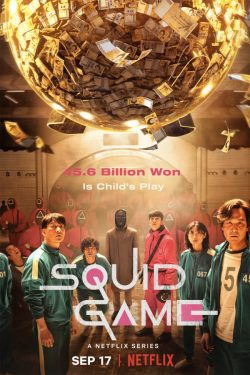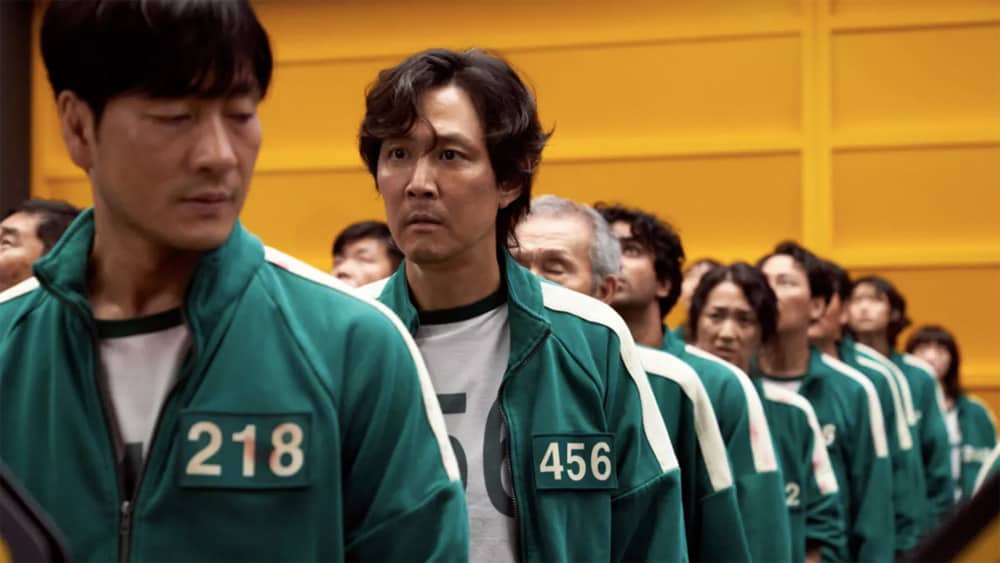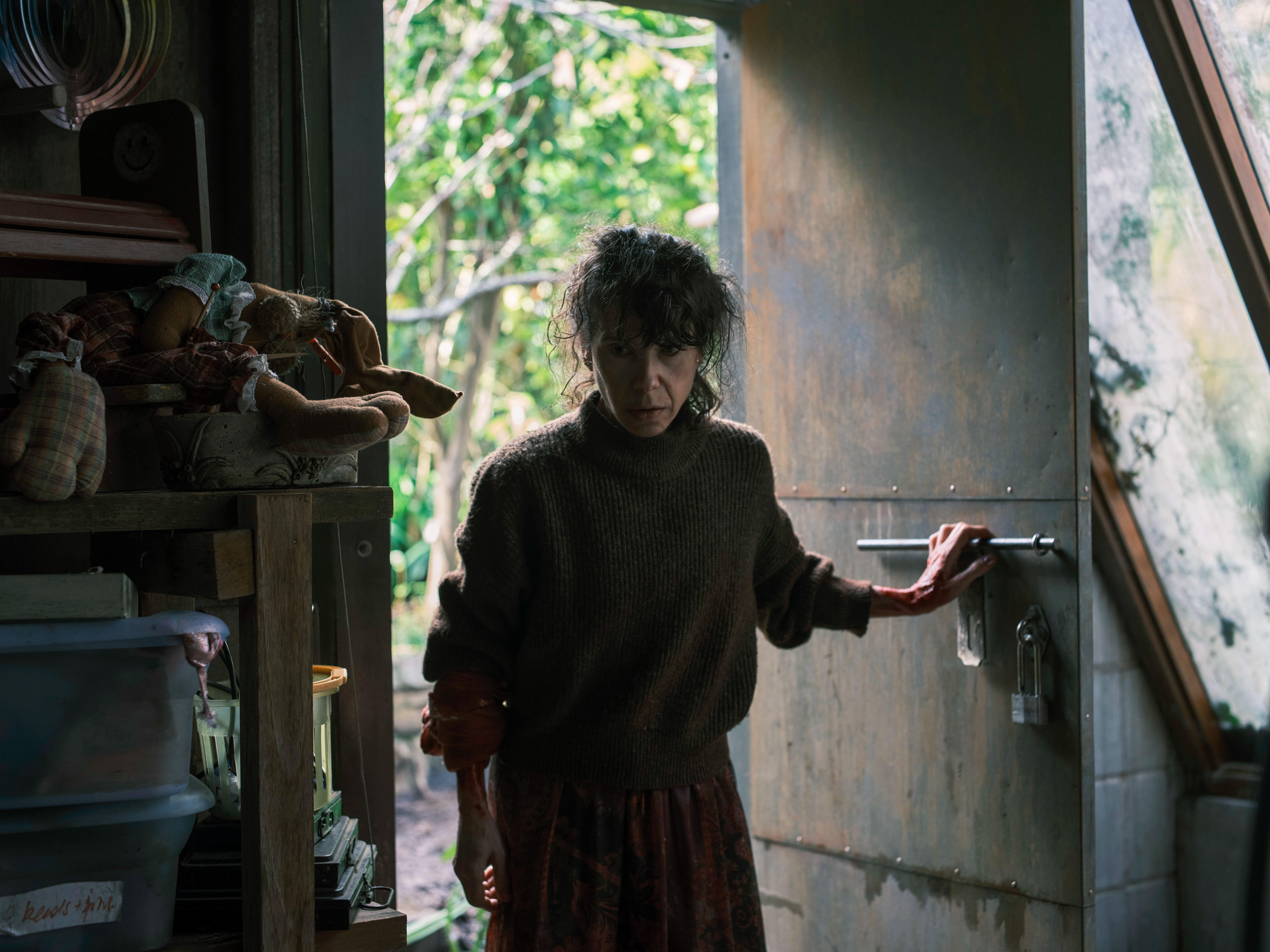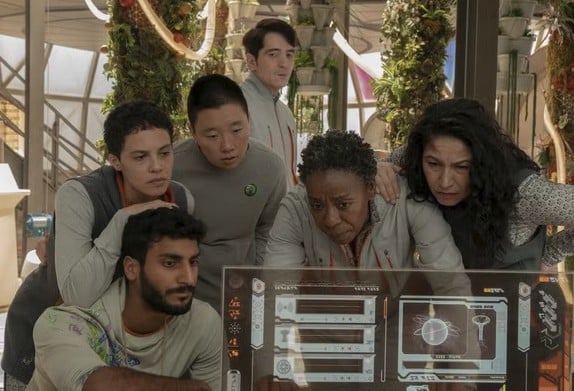Watercooler Pick

Squid Game
- Series
- Where to Find It: Netflix
- Rating: TV-MA
- Release Date: 2021
- Seasons: 1 Season
- Episodes : 9 Episodes
- Length: One Hour
Recommended by:
Share on social media
Find More Watercooler Picks
In this horror-science-fiction hybrid from South Korea, 456 people agree to play deadly versions of children’s games for a cash prize in the millions. Assigned numbers instead of names, and watched over by masked, anonymous guards, the characters must compete in horrific trials, hoping for a chance to settle their debts or improve their lives if they survive.
Though most are relative unknowns in the US, the cast features many veteran South Korean actors, including Gong Yoo, who played a careless playboy in the 2007 drama Coffee Prince; Kim Young-ok, whose career in television and cinema spans six decades; and many others. Director Hwang Dong-hyuk has several acclaimed feature films under his belt, including the lighthearted Miss Granny.
 This deadly-survival-game series is so popular that SK Broadband sued Netflix shortly after it debuted, claiming the show led to such a surge in traffic that streamer should pay network usage fees. So what gives? For starters, maybe we’re all struggling just a little bit under modern surveillance capitalism, of which the show offers a not-so-subtle allegorical critique.
This deadly-survival-game series is so popular that SK Broadband sued Netflix shortly after it debuted, claiming the show led to such a surge in traffic that streamer should pay network usage fees. So what gives? For starters, maybe we’re all struggling just a little bit under modern surveillance capitalism, of which the show offers a not-so-subtle allegorical critique.
In the first episode we meet Seong Gi-hun (Lee Jung-jae), a laid-off factory worker who’s deep in debt to loan sharks. What’s more, he needs money to fight for custody of his young daughter before his remarried ex-wife emigrates with the child to the US. Gi-hun works as a chauffeur, but he needs more cash than he can possibly earn by honest or normal means. Then, a well-dressed stranger (Gong Yoo) in a train station seems to offer a solution: would Gi-hun like to play games for money?
Out of options, Gi-hun decides to give it a try. In short order, we meet some of the 455 others who have made the same choice, for similarly compelling reasons. There’s Kang Sae-byeok (Jung Ho-Yeon), a North Korean defector who needs money to bring the rest of her family across the border; Cho Sang-woo (Park Hae-soo), a childhood friend of Gi-hun, who’s wanted by the police for embezzlement; and Abdul Ali (Anupam Tripathi), an illegal immigrant with a family to support, with no recourse when his employer stops paying him. There’s also Hwang Jun-ho (Wi Ha-joon), a cop who infiltrates the game, posing as a guard in the hope of finding his missing brother, whom he believes was previously recruited to play.
 The characters’ backstories speak to one of the show’s most brutal twists: The players aren’t forced to compete. Nor are they picked at random. They’re given a choice, and are even allowed to vote as a group on whether to continue the game or go back to their lives. But they have no other options. If you’ve ever added up the amount of money it would take to cancel all your debt, pay for a loved one’s medical procedure, or even just feel a little ahead of the game for a while, there will be moments when you wonder if you might make the same choice to try and win the money. Significantly, the masked guards who run the game glibly describe the measures they must take to protect their own confidentiality, while casually stripping the players of any privacy, down to making every player’s debts public.
The characters’ backstories speak to one of the show’s most brutal twists: The players aren’t forced to compete. Nor are they picked at random. They’re given a choice, and are even allowed to vote as a group on whether to continue the game or go back to their lives. But they have no other options. If you’ve ever added up the amount of money it would take to cancel all your debt, pay for a loved one’s medical procedure, or even just feel a little ahead of the game for a while, there will be moments when you wonder if you might make the same choice to try and win the money. Significantly, the masked guards who run the game glibly describe the measures they must take to protect their own confidentiality, while casually stripping the players of any privacy, down to making every player’s debts public.
In a delicious bit of visual storytelling, the prize money the players are competing for accumulates in a massive, transparent piggy bank suspended from the ceiling of the dorm where they sleep. It serves as a looming stand-in for the illusory prize of winning the rat race. As alliances form, then break, they mirror the ruthless, winner-takes-all mentality that capitalism breeds. The show finds a dozen ways to illuminate the way basic human morality is distorted when we’re forced to choose between our own well being and that of the rest of humanity. And the final twist? It manages to be maddening, satisfying, enraging, and uplifting all at once.
With its nuanced performances from a standout cast, its haunting soundtrack, and its eerie, candy-colored sets and costumes, Squid Game cloaks a thought-provoking allegory about capitalism, wealth inequality, and social injustice in a gripping, fast-paced drama.
A native Korean speaker, if you can. Subtitling Korean shows for Western audiences can be an imprecise business, since character limits based on reading speed often make it tough for translators to do justice to complex concepts and dialogue. If none of your friends are fluent, check out Korean-American comedian Youngmi Mayer (@ymmayer)’s Twitter thread about some nuances that were missing from the subtitles.
Violence is inherent to the show’s premise, and the camera doesn’t shy away from the bloodshed–but you probably expected that. What may catch you off guard, though, is the emotional roller-coaster ride each episode delivers. Moments as simple as the signing of a contract or the unwrapping of a child’s birthday present carry unexpected sucker-punches. And it only gets worse as the characters—with all their imperfections, their heartrending struggles, and their humanity — double down in the savage battle for survival.
- Moods: find me mature fun, grip me, shock me, thrill me, transfix me, transport me, up my adrenaline
- Interests: conversation worthy, edgy, international, politics, psychological drama, satire, sports

Lara Kristin Herndon








